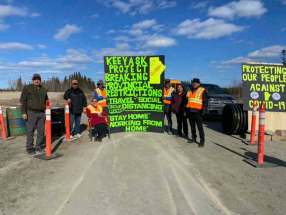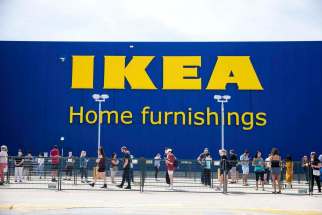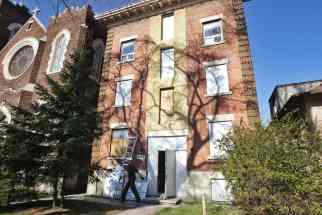Derelict-buildings proposal has merit
Read this article for free:
or
Already have an account? Log in here »
To continue reading, please subscribe:
Monthly Digital Subscription
$0 for the first 4 weeks*
- Enjoy unlimited reading on winnipegfreepress.com
- Read the E-Edition, our digital replica newspaper
- Access News Break, our award-winning app
- Play interactive puzzles
*No charge for 4 weeks then price increases to the regular rate of $19.00 plus GST every four weeks. Offer available to new and qualified returning subscribers only. Cancel any time.
Monthly Digital Subscription
$4.75/week*
- Enjoy unlimited reading on winnipegfreepress.com
- Read the E-Edition, our digital replica newspaper
- Access News Break, our award-winning app
- Play interactive puzzles
*Billed as $19 plus GST every four weeks. Cancel any time.
To continue reading, please subscribe:
Add Free Press access to your Brandon Sun subscription for only an additional
$1 for the first 4 weeks*
*Your next subscription payment will increase by $1.00 and you will be charged $16.99 plus GST for four weeks. After four weeks, your payment will increase to $23.99 plus GST every four weeks.
Read unlimited articles for free today:
or
Already have an account? Log in here »
Hey there, time traveller!
This article was published 20/05/2020 (2031 days ago), so information in it may no longer be current.
The city is often urged to clamp down on vacant buildings that are linked to the scourges of methamphetamine and crime. That is easier said than done.
Even though some derelict properties are known to be dens of illegal activity and the frequent source of fires, the administrative measures required to seize the properties can be a marathon of notices, fines and appeals that stretch on interminably. But a report delivered to a city committee last Thursday proposes a creative way to deal with owners of such properties, particularly those plagued by people who trespass with criminal intentions in mind.
The city could order the owners of boarded-up buildings to add security cameras, extra lighting and/or security guards at their own expense, said the report by Michael Jack, Winnipeg’s chief corporate services officer. If the owners didn’t comply, the cost could be added to their property tax bills.

Mr. Jack submitted the report in response to a request from the property and development committee for recommendations on how to clamp down on meth houses, other than by having the city purchase the vacant buildings. His suggestions are not yet scheduled for a full-council vote on the matter, but they should be given due consideration.
Perhaps the councillor best suited to push the matter to a vote is the committee chair Coun. Brian Mayes, who spoke for many Winnipeggers when he said meth use in the city has reached a crisis level.
The Addictions Foundation of Manitoba says that since 2014, meth use has soared by more than 100 per cent in adults and nearly 50 per cent in youth. Winnipeg Police Service Chief Danny Smyth has said much of the city’s crime — there were 44 homicides in Winnipeg in 2019, double the number in 2014 — is tied to the soaring rate of meth use. The violent and unpredictable behaviour of meth users is also straining the city’s paramedics and hospital emergency departments.
Although the owners of many of the 600 or so vacant buildings in Winnipeg follow the rules and are not a public concern, a number of vacant buildings — mostly located in economically challenged neighbourhoods — are occupied by squatters who disregard such routine obligations as paying rent and adhering to a landlord’s rules.
Among those urging the city to take action are neighbours concerned about property values and their personal safety, and also firefighters who know from too much experience that those who occupy vacant buildings will sometimes make unwise choices in an effort to stay warm, which can result in fires that spread and become well involved before first responders are alerted. Such an example was a derelict apartment building on Maryland Street, which suffered three fires in the past year.
The city has tried to reduce the number of vacant buildings, through a 2011 bylaw that lets inspectors fine owners of boarded-up buildings and levy an annual empty-building fee that bills owners one per cent of the property’s most recently assessed value.
That bylaw is apt, but obviously inadequate. The number of troublesome vacant buildings in Winnipeg indicates the current penalties are not enough to persuade heedless owners to act with responsibility that is expected of all Winnipeg property owners.
With fines that increase until co-operation is secured, owners of derelict properties should be forced into one of two choices: maintain their properties, or sell them. Ongoing negligence shouldn’t be an option.






